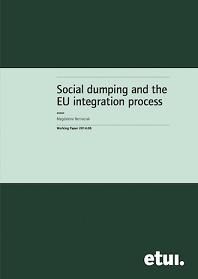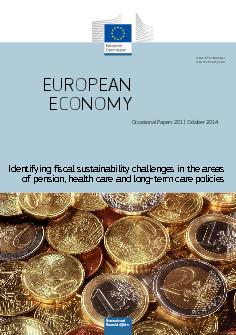Bernaciak, M. (2014) “Social Dumping and EU Integration Process“, European Trade Union Institute (ETUI), Working Paper 2014.06, 14 Οκτωβρίου. Abstract This paper proposes a conceptualization of social dumping and applies it to an analysis of the EU integration process. Building on recent contributions in the fields of economic theory, economic sociology and institutional political economy, it defines social dumping as the practice, undertaken by self-interested market participants, of undermining …Read More
The great mortgaging
Jordà, Ο., Taylor, A. & Schularick, M. (2014) “The great mortgaging“, VoxEU Organisation, 12 Οκτωβρίου. The Global Crisis prompted Lord Adair Turner to ask if the growth of the financial sector has been socially useful, catalysing an ongoing debate. This column turns to economic history to investigate whether the financial sector is too big. New long-run, disaggregated data on banks’ balance sheets show that mortgage lending by banks has …Read More
A New Age Of IMF Bailouts – Great Britain In The 1970s
Tavares, E. M. (2014) “A New Age Of IMF Bailouts – Great Britain In The 1970s“, ΘZeroHedge, 12 Οκτωβρίου. Hearing of IMF interventions generally conjures up images of developing nations (and the occasional Eurozone peripheral economy of late) facing some kind of financial difficulty. But it was actually Great Britain, the cradle of the industrialized world, which in 1976 became one of the first countries ever to be “bailed …Read More
Fighting Deflation: Would QE work in the euro area?
Gros, D. (2014) “Fighting Deflation: Would QE work in the euro area?“, Economic Policy, CEPS Commentaries, 09 Οκτωβρίου. With inflation in the eurozone stubbornly remaining on a downward trajectory, pressure is growing on the ECB to do “something” to prevent outright deflation. But, given the financial structure of eurozone countries, would the preferred “something” – quantitative easing – actually do the trick? Σχετικές αναρτήσεις: Wyplosz, C. (2014) “Is …Read More
Making the Most of EU Labour Mobility
Barslund, M. & Busse, M. (2014) “Making the Most of EU Labour Mobility“, Social welfare policies, CEPS Task Force Reports, 07 Οκτωβρίου. This Task Force report combines the most recent data from Eurostat with national sources to highlight the most significant labour mobility trends within the EU. Overall, the recent recession has not induced previously immobile workers to become more mobile, at least not in the larger member states. …Read More
Implementing economic reforms – are EU Member States responding to European Semester recommendations?
Deroose, S. & Griesse, J. (2014) “Implementing economic reforms – are EU Member States responding to European Semester recommendations?“, ECFIN Economic Brief, Issue 37, Οκτώβριος 2014. Summary: For the past four years, the EU has issued country-specific recommendations for economic reform to its Member States under the European Semester. A synthetic indicator of EU-wide implementation of these recommendations shows a score of just over 40%. While this is higher …Read More
Europe is suffering from a psychological blind spot over migration in the Mediterranean
Zaiotti, R. (2014) “Europe is suffering from a psychological blind spot over migration in the Mediterranean“, LSE EUROPP, 10 Οκτωβρίου. The death of migrants in the Mediterranean remains a significant problem for EU migration policy. Ruben Zaiotti argues that Europe’s approach to the issue can effectively be termed a type of ‘externalisation’, in which the responsibility for migration has been off loaded to origin and transit countries. He writes …Read More
International Debt and Financial Crises
Joyce, P. J. (2014) “International Debt and Financial Crises“, Economonitor, 09 Οκτωβρίου. The latest issue of the IMF’s World Economic Outlook has a chapter on global imbalances that discusses the evolution of net foreign assets (also known as the net international investment position) in debtor and creditor nations. The authors warn that increases in the foreign holdings of domestic liabilities can raise the probability of different types of financial crises, including banking, currency, …Read More
Beware of Europe’s Policy Hardening
El-Erian, Α. Μ. (2014) “Beware of Europe’s Policy Hardening“, Bloomberg View, European Economy, 10 Οκτωβρίου. Judging from the recent remarks by European officials, policy positions are hardening once again in the euro zone. Fueled by disappointing economic performance, the risk is that the deepening difference in views in Europe will further complicate a much-needed recovery. This is regrettable because it need not be so. Having flirted with a disorderly …Read More
Identifying fiscal sustainability challenges in the areas of pension, health care and long-term care policies
Eckefeldt, P., Schwierz, C., Giamboni, L., Aarnout, M. & Carone, G. (2014) “Identifying fiscal sustainability challenges in the areas of pension, health care and long-term care policies“, European Economy – Occasional Papers, No. 201, European Commission: Economic and Financial Affairs, Οκτώβριος. This paper presents a horizontal assessment framework used by the Commission services to identify structural-fiscal reforms that are deemed necessary to address fiscal sustainability challenges in the Member …Read More






